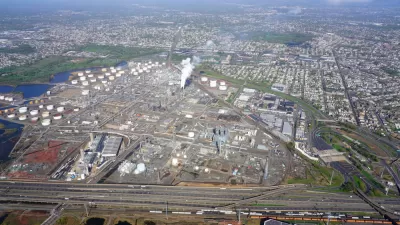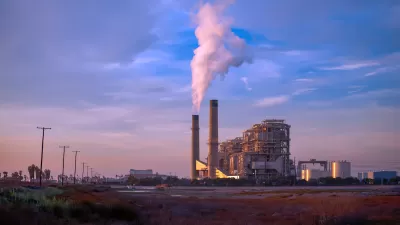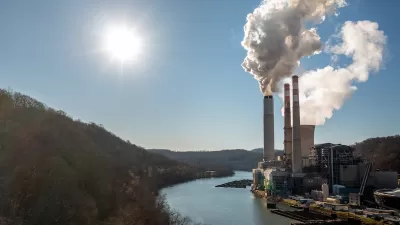While the impact on inflation of the questionably-titled Inflation Reduction Act remains to be seen, the law will mitigate the damage done by a landmark Supreme Court case in June that gutted the EPA's authority to regulate greenhouse gas emissions.

"When the Supreme Court restricted the ability of the Environmental Protection Agency to fight climate change this year, the reason it gave was that Congress had never granted the agency the broad authority to shift America away from burning fossil fuels," wrote Lisa Friedman, a climate and environment reporter for The New York Times, on Aug. 22.
Now it has.
Throughout the landmark climate law, passed this month, is language written specifically to address the Supreme Court’s justification for reining in the E.P.A., a ruling that was one of the court’s most consequential of the term.
See Planetizen news post and blog on the landmark W. Va. v. EPA case:
- Supreme Court Guts the U.S. EPA’s Ability to Limit Carbon Emissions, June 30, 2022
- Blog: Did the Supreme Court Gut Federal Power? July 3, 2022
"That language, according to legal experts as well as the Democrats who worked it into the legislation, explicitly gives the E.P.A. the authority to regulate greenhouse gases and to use its power to push the adoption of wind, solar and other renewable energy sources," adds Friedman.
Jody Freeman, a professor at Harvard Law School and an expert on the Clean Air Act, said the language cemented E.P.A.’s authority and would be “a powerful disincentive” to new lawsuits.
In agreement are senators from both sides of the aisle cited in the piece:
- Senator Tom Carper, the Delaware Democrat who led the movement to revise the law stated, “The language, we think, makes pretty clear that greenhouse gases are pollutants under the Clean Air Act."
- “It’s buried in there,” Senator Ted Cruz, Republican of Texas, said on Fox Business Network ahead of the Senate vote. “The Democrats are trying to overturn the Supreme Court’s West Virginia vs. E.P.A. victory,”
Massachusetts v. E.P.A., 2007
"The [Inflation Reduction] act does define greenhouse gases in some sections, but does not explicitly direct the Environmental Protection Agency to regulate carbon dioxide," continues Friedman.
Rather, it more broadly asks the agency to regulate pollutants that “endanger human health.” In 2007, the Supreme Court, in Massachusetts vs. E.P.A., No. 05-1120, ordered the agency to determine whether carbon dioxide fit that description. In 2009, the E.P.A. concluded that it did.
See two posts on auto emissions and power plant emissions that reference the landmark climate case:
- Who's Advocating Rolling Back Fuel Economy Standards? December 17, 2018
- Federal Court Decision Dooms Most New Coal Power Plants, June 28, 2012
"Yet, because Congress had never before directly addressed the issue, challenges have continued," continues Friedman.
In West Virginia vs. E.P.A., No. 20-1530, the landmark ruling this year, conservative Supreme Court justices made clear that if lawmakers really wanted the government to move away from fossil fuels, they should say so.
And the language embedded in the downsized H.R 5376 that was unveiled on July 27, passed the Senate on Aug. 7, the House on Aug. 12, and signed by President Biden on Aug. 16, does just that, the act's 'secret climate weapon.'
Related: See three news posts and one feature tagged 'Inflation Reduction Act.'
FULL STORY: Democrats Designed the Climate Law to Be a Game Changer. Here’s How.

Planetizen Federal Action Tracker
A weekly monitor of how Trump’s orders and actions are impacting planners and planning in America.

Maui's Vacation Rental Debate Turns Ugly
Verbal attacks, misinformation campaigns and fistfights plague a high-stakes debate to convert thousands of vacation rentals into long-term housing.

San Francisco Suspends Traffic Calming Amidst Record Deaths
Citing “a challenging fiscal landscape,” the city will cease the program on the heels of 42 traffic deaths, including 24 pedestrians.

Amtrak Rolls Out New Orleans to Alabama “Mardi Gras” Train
The new service will operate morning and evening departures between Mobile and New Orleans.

The Subversive Car-Free Guide to Trump's Great American Road Trip
Car-free ways to access Chicagoland’s best tourist attractions.

San Antonio and Austin are Fusing Into one Massive Megaregion
The region spanning the two central Texas cities is growing fast, posing challenges for local infrastructure and water supplies.
Urban Design for Planners 1: Software Tools
This six-course series explores essential urban design concepts using open source software and equips planners with the tools they need to participate fully in the urban design process.
Planning for Universal Design
Learn the tools for implementing Universal Design in planning regulations.
Heyer Gruel & Associates PA
JM Goldson LLC
Custer County Colorado
City of Camden Redevelopment Agency
City of Astoria
Transportation Research & Education Center (TREC) at Portland State University
Jefferson Parish Government
Camden Redevelopment Agency
City of Claremont





























